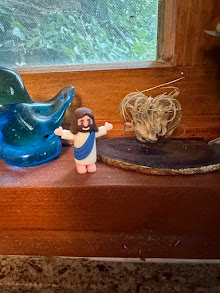
If I've heard it once, I've heard it two dozen times: at sales over the years, after the break, or perhaps just before, the auctioneer will intone the mantra, "They're not making any more of it!" We lookers on will snigger just a bit because the whole ritual is so predictable. The "it" in question is farm land and the auctioneer is using every trick in the book to coax the last few dollars per acre. Like the hucksters in television infomercials, we are led to believe this piece of property, this issue of commemorative coins, will be the very last and we'd best get while the getting is good.
"I was a child of the sixties, while dreams could be held on TV...and I believed, I believed, I believed." This is liberal songster Nanci Griffith reminding us of the "good old days". Well, I was a child of the sixties, too, and I remember the environmental meters in the National Wildlife magazines my parents got in the mail. I remember the first Earth Day and the dread and foreboding I felt when I read the assessments and noted the trends in the categories of air, water, wildlife and.....urban sprawl. We were running out of forest, running out of prairie: running out of land. I believed, I believed, I believed: I was a child of the Chicago suburbs, living on the front lines of the transition from black earth to back yard.
And then, I was a student of agriculture in the seventies, the first agricultural boom in decades. Though the term globalization was not yet jargon, a new generation of farmers was beginning to realize the potential of exports. The world was hungry; we had land 'set aside' to feed it. We were on the cusp of a technological revolution in U.S. agriculture and it was a good thing: we were going to need every possible advantage to overcome the monstrous obstacles of a growing population worldwide. We were cognizant of the writings of Paul Ehrlich, the warnings of the Club of Rome. We were prepared to make the most of the limited resources at our disposal, to beat the odds makers, to fill the gap between the haves and have nots, to feed all the people represented by that growing area under the population growth line on the graph.
So.....so....what happened? When in this time line that I know like the back of my hand did land become a surplus? Did I miss something? Am I missing something? The market, a pretty good indicator, is sending the message of scarcity: raise more crops, says $7/bushel corn! The land market says the same thing: even in northwest Missouri, an acre of land has broken $10,000, an absurd, unheard of value for our risky weather, no matter how fine the land lays.
I need to know: when did we quit worrying about urban sprawl, feeding the world, and decide we had a surplus of arable land in the humid breadbasket of the world?
Because that's what I'm hearing right now in defiance of all past history, all present statistics, and all reasonableness. All of a sudden, after our forefathers cleared the timber, our grandfathers drained the swamps, and our fathers laid the land to grade and irrigated it, all this land is disposable, unneeded, worthless. The crops grown during nearly three seasons of the year have less value than cottonwoods and cottonmouths. What kind of math is this? I am speechless when I contemplate the possibility of this beautiful cultivated patchwork of fields, homes, and small communities returning to scrub and twelve foot tall horseweeds.
The current levee system is the federal government's reaction to the monster flood and dislocation of 1927. Then, as now, the authorities chose to protect the urban areas, especially New Orleans, while sacrificing the lowlands, the farms, the villages in between. The flooding this year is the result of nature's excess, not merely the actions of man. But the willful dismissal and denial of the vital agricultural economy of the river bottoms could wind up being more destructive in the long term than any breached levee, controlled or no.
Do we rebuild after earthquakes? Do we come back to the coasts after hurricanes? Did we leave Chicago in rubble after the fire? We need our cities, our homes, our coasts, even our multi-million dollar mansions in the tinder dry brush of the California hills. Is this the first time we turn our backs on disaster?
If we as a society declare our willingness to repair, rebuild and renew these, how can we possibly reject the call to make the Mississippi river bottom grounds whole again? Back in the sixties, we were told 'the world doesn't need another mountain', it just needed 'love, sweet love'. The world may well have plenty of mountains. But the evidence is plain enough to me that we will never have enough good productive farm land.
After all, they're not making any more of it.
















No comments:
Post a Comment